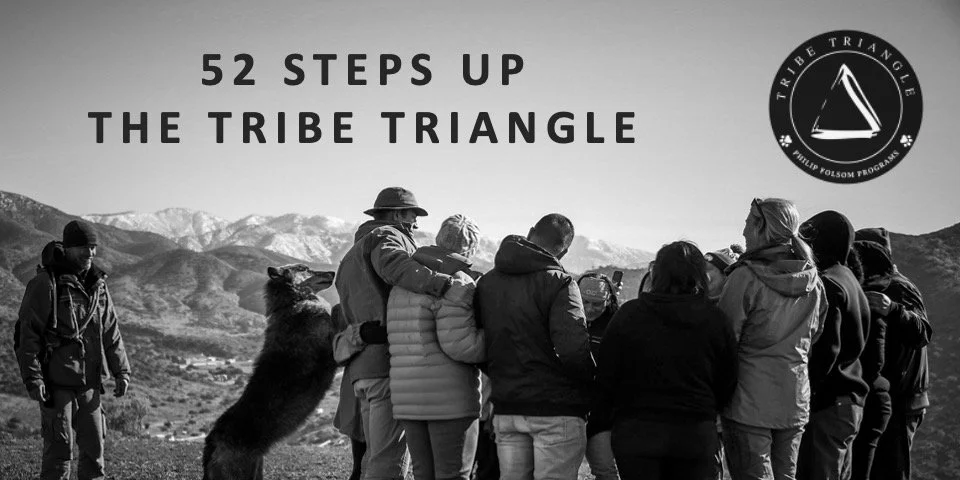Step 9 Up the Tribe Triangle: Reciprocity
“There is one word which may serve as a rule of
practice for all one’s life-reciprocity.”
-Confucius
Reciprocity is one of the main behavioral engines that drives kinship and an honor-based culture. You need this people power source because without established reciprocity practices in place, members of your family, community or company will begin to disengage and only perform in immediate, transactional ways.
Reciprocity is a downstream creation from your earlier tribe development work of transparency and collaboration. Remember, transparency drives collaboration in your people and your projects and both transparency and collaboration must be in place for sustainable reciprocity to be created and maintained.
Like all the other components of your foundation of alignment, reciprocity drives behavior of your people, quality of your process and results of your projects.
rec·i·proc·i·ty
/ˌresəˈpräsədē/
noun
The practice of exchanging things with others for mutual benefit, especially privileges granted by one organization to another
Reciprocity is a social norm that involves in-kind exchanges between members of a group. It is the agreed upon response to another's action with another equivalent action and denotes a deep interconnection between people who share a foundation of alignment.
In Stone Age Economics (1972), anthropologist Marshall Sahlins identified three modes of reciprocity:
Generalized Reciprocity.
Balanced Reciprocity.
Negative Reciprocity.
We are going to explore all three of these forms of reciprocity in relationships because they are the mutual exchange of energy and support between partners. In a nutshell, the three forms of reciprocity are: Generalized Reciprocity is giving without expecting an immediate specific outcome. Balanced Reciprocity is an immediate equal give-and-take, and Negative Reciprocity is the exchange of consequences when boundaries are crossed or agreements are broken (Fehr & Gächter, 2000).
Generalized Reciprocity
In honor-based cultures, Tribe Leaders are not as much concerned about maximizing immediate, measurable net results (like income) but rather their net giving because gathering a large number of beneficiaries who owe them a reciprocal favor is much more powerful because favors are a universal form of currency and accrue over time. Generalized reciprocity is apparent in functional politics at every level and you can both witness it and feel it in your team.
Generalized Reciprocity is a form of investing in the relationships of your people and your people themselves. This investment has the highest ROI you can make. People breaking this social agreement tear at the very fabric of your team and lead to massive loss of honor and standing. People who do not understand and abide by this form of reciprocity are toxic takers and will quickly self-select out or will be removed from the tribe and you are better off without them until they learn that Generalized Reciprocity drives the power of networking, socializing and alliance-building and is indispensable for long-term success of themselves as an individual and as a tribe.
Tribe Leaders giving attention and mentorship to followers in exchange for commitment and loyalty is also an example of Generalized Reciprocity.
Balanced Reciprocity
Balanced reciprocity is an immediate and equal give and take. It is so core to successful cultures that according to the ancient philosopher, Seneca: “Any exchange of gifts or services produced mutual obligations between benefactor and beneficiaries.”
For the good, pride-based people that you are attracting and onboarding into your honor-based culture, this is the easiest form of reciprocity to grasp because it is immediate and simple.It also powers a live and tangible improvement in the three organizational performance pillars of people, process and project success.
Balanced Reciprocity Powers People
Balanced Reciprocity powers people because it underscores the fact that in your developing honor-based tribe, people’s behaviors are actually seen and acknowledged. This makes people feel like they are not just a faceless gear in a machine and that their hard work, attention to detail and care will be witnessed and rewarded. This is the kinship and relationship connections that come from your earlier investment in transparency and collaboration. Reciprocity is also a primary driver of feelings of belonging which is central the indispensable tribe function of resiliency which will be a repeated theme the rest of this journey!
Balanced Reciprocity Powers Process
In addition to relationship-based people upgrades of morale and retention, Balanced Reciprocity also drives improvement of process because there is an immediate reward for excellence, attention to detail, innovation, finishing and all other forms of process success. Balanced reciprocity is the most powerful form of human currency that makes people feel like their investment in a team is paying off.
Balanced Reciprocity Powers Projects
Balanced Reciprocity drives overall project success because it rewards success behaviors in general. Balanced Reciprocity powers all the mission best practices we have developed and are developing because it actively and immediately rewards them. Examples of these mission success best practices are asking for help (vulnerability), giving help(collaboration), goal setting and implementation and all the other life skills that are so integral to ongoing project success. Reward your people for project success and you will train them to continue that behavior. Establish that reward system in your whole culture and watch success blossom!
Negative Reciprocity
It is important to note that although reciprocity is usually positive (e.g. returning a favor), it can also be seen as having a short term negative impact (e.g. punishing a negative action). This is not a dynamic that is commonly accepted in today’s culture but it is the source of many indispensable tribe norms such as maintaining healthy boundaries, competition, conflict resolution and, most importantly, creating a culture of accountability. We will be getting to all of that later on this journey of culture development when we get to part 3 of the Tribe Triangle!
Kinship is the engine that sits in the very center of your tribe and honor-based culture. Reciprocity is the engine that powers kinship. Reciprocity is indispensable for building and maintaining this rare and high-performing form of culture.
Click here To watch the video of Step 9: Reciprocity
Leaders must write and speak
Answer these questions in your journal by really writing them down. Discuss them with at least one of your most important people and really listen to their response.
1. Generalized Reciprocity is investing energy or resources in your people without an immediate return.
What is a specific, altruistic form of this investment of favor or support you can make in one of the important members of your tribe?
Who is that person and why do you choose them to give your limited resources to?
2. Balanced Reciprocity is an immediate return of energy you can give to reinforce honorable behavior to someone in your tribe.
What is the specific behavior being rewarded?
What is the immediate reward from you as Tribe Leader?
3. Negative Reciprocity is the push back or uncomfortable response when a tribe member does something dishonorable such as crossing a clear boundary, behaving in a manner that is not in alignment with tribe values or not following through on a project.
What is a specific and recent example of this negative behavior?
Who was the person and what is an example of effective Negative Reciprocity from you as Tribe Leader?
Ubuntu,
Philip Folsom






